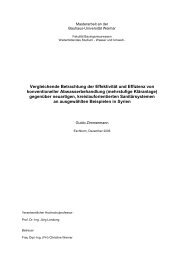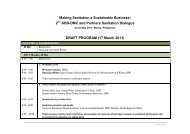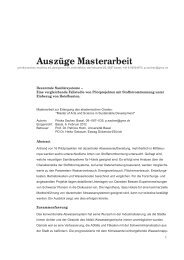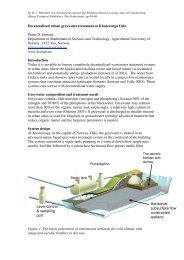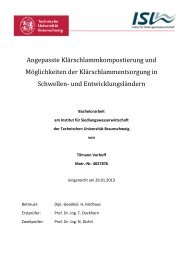A QUANTITATIVE APPROACH TO PREDICT ... - SuSanA
A QUANTITATIVE APPROACH TO PREDICT ... - SuSanA
A QUANTITATIVE APPROACH TO PREDICT ... - SuSanA
Create successful ePaper yourself
Turn your PDF publications into a flip-book with our unique Google optimized e-Paper software.
instructing the person on appropriate behaviours. 67 Cognitive models in the first place,<br />
assume that the individual being rational, evaluate the cost and benefit of a behaviour<br />
before making the intention to behave in a certain way. 68 Examples of cognitive models<br />
are Health Belief Model (HBM) and Protection Motivation Theory (PMT). The HBM<br />
which was developed in 1966 by Rosenstock, was initially to predict preventive health<br />
behaviours but now used in a wide range of health-related behaviours. The main<br />
components of HBM in the prediction are the individual’s perception of his chances of<br />
attaining an illness, the severity of the sickness, the cost and benefit involved in<br />
carrying out a behaviour, cues for action, health motivation and perceived control. 69<br />
PMT on the other hand, was developed as an expanded form of the health belief model<br />
by Rogers. 70 PMT is based on perceived severity of a disease, perceived vulnerability to<br />
illness, response effectiveness of a certain health action and self efficacy expectation<br />
towards a health action. 71 These cognitive theories have been criticised that they<br />
emphasis much on the individual and does not say anything on the role that the social<br />
and the economic environment play in predicting the behaviour of the individual. 72<br />
Social cognitive models based on the social context of cognition, analyses the factors<br />
that predict behaviour and assess why people refuse to maintain a particular behaviour<br />
to which they had initial commitment. 73 It is based on the conviction that principles and<br />
methods of information processing are important to explain complex social<br />
behaviours. 74 Social cognition theory was developed by Albert Bandura (1977, 1986)<br />
and predicted that behaviour is governed by expectancies, incentives and social<br />
cognitions. 75 Expectancies can be divided into three groups namely; situation outcome<br />
expectancies, outcome expectancies and self-efficacy. Incentives refer to the<br />
individual’s perceived importance of an outcome of a behaviour and social cognition is<br />
where an individual represent the social world. 76 Many models and theories have been<br />
67 Ibid<br />
68 Ogden, Jane, 2007, pp. 23-24<br />
69 Ibid<br />
70 Schwarzer, Ralf, 1992, p. 229<br />
71 Ibid<br />
72 . Ogden, Jane, 2007, pp. 26-29<br />
73 Ibid<br />
74 Pratkanis, Anthony; Breckler, Steven and Greenwald, Anthony, 1989, p.30-31<br />
75 Ogden, Jane, 2007, pp. 26-29<br />
76 Ibid<br />
15



